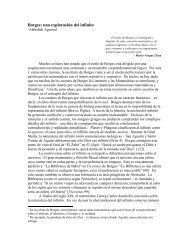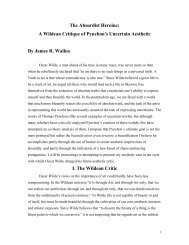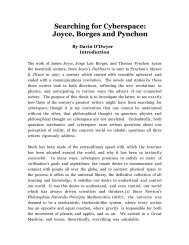And A Very Good Time It Was: A Short Life of ... - The Modern Word
And A Very Good Time It Was: A Short Life of ... - The Modern Word
And A Very Good Time It Was: A Short Life of ... - The Modern Word
You also want an ePaper? Increase the reach of your titles
YUMPU automatically turns print PDFs into web optimized ePapers that Google loves.
she kicked her husband out <strong>of</strong> her house. By then Nora, born in 1884, had been living with her<br />
maternal grandmother, and to those who assume her to be uneducated, it’s worth noting first that<br />
most <strong>of</strong> us would seem so next to Joyce; and second that she did attend school until she was<br />
twelve—the longest a girl could be educated in the free schools <strong>of</strong> the day. 61<br />
Two early loves both hardened her heart and made her ready for a man like Joyce. <strong>The</strong> first,<br />
at twelve, was a crush on the sixteen year-old Michael Feeney, who fell ill with typhoid and died.<br />
Joyce’s poem “She Weeps Over Rahoon” is his ode to Nora’s grief, so many years later, for this<br />
young man she probably hardly knew. <strong>The</strong>n came Michael Bodkin—but at twenty he, too, died,<br />
this time <strong>of</strong> tuberculosis. Feeney and Bodkin were the models for Michael Furey in Joyce’s “<strong>The</strong><br />
Dead,” and their deaths earned the sixteen year-old Nora the nickname “man-killer” from her<br />
peers. 62<br />
Her grandmother had died a few weeks before Feeney, so by 1904 she had been living with<br />
her mother and her mother’s brother, Tom Healy, for some time. <strong>The</strong> more one knows about Nora<br />
the more admirable and complex she is: one moment she seems entirely adult in her grief over<br />
two dead loves, and the next she’s an entirely normal girl <strong>of</strong> her day, running around with her<br />
friends and playing superstitious games to foretell the names <strong>of</strong> their future husbands. Another<br />
has her and her friends traipsing around Galway in the evening, though dressed in men’s<br />
clothes—no minor thing in 1900 Ireland. Her Uncle Tom was known to scour the streets looking<br />
for her to keep her in line, but Nora was no more a conformist than Joyce. So when a Protestant,<br />
William Mulvagh, asked her out, she didn’t hesitate to deceive her Uncle. When her Uncle found<br />
out and beat her, she wasted no time leaving home, leaving Galway, and moving to Dublin. 63<br />
She found a job at Finn’s Hotel and met Joyce soon after, and when not together they wrote<br />
to each other. Brenda Maddox, in probably the only other biographical work to be as essential as<br />
Ellmann’s, says,<br />
<strong>The</strong> swift progress <strong>of</strong> their love affair depended upon a superb postal system.<br />
<strong>The</strong>re were five deliveries a day, with the first collection at quarter past one in<br />
the morning. Joyce, who liked to write in the small hours <strong>of</strong> the morning, took<br />
full advantage <strong>of</strong> the service. 64<br />
Nora’s letters, aside from winning Joyce emotionally and spiritually and physically, would<br />
later inspire Molly Bloom’s monologue in Ulysses. “Do you notice how women when they write<br />
disregard stops and capital letters?” 65 he wrote to Stanislaus. So we have two views <strong>of</strong> Nora, just<br />
from her letters: simple and seemingly uneducated, but also inspiring. Nora once expressed this<br />
paradox herself. Tired <strong>of</strong> Joyce’s drunkenness in Paris nearly twenty years later, she yelled,<br />
People say I have helped him to be a genius. What they’ll be saying next is that if<br />
it hadn’t been for that ignoramus <strong>of</strong> a woman what a man he would have been!<br />
But never you mind. I could tell them a thing or two about him after twenty<br />
years... 66<br />
Whatever critics and elites may want to say about Nora, though, it was Joyce who stayed with<br />
her. He wrote to Stanislaus in 1905,<br />
You are harsh with Nora because she has an untrained mind. She is learning<br />
French at present—very slow. Her disposition, as I see it, is much nobler than my<br />
own, her love also is greater than mine for her. I admire her and I love her and I<br />
trust her—I cannot tell how much. I trust her. So enough. 67<br />
While Stanislaus became jealous <strong>of</strong> his relationship with Nora, his friends merely mocked it,<br />
while in her he saw the true expression <strong>of</strong> the simple and commonplace that he wished to make<br />
the foundation <strong>of</strong> his art.<br />
So in a short time Joyce had stumbled upon his first novel and met the love <strong>of</strong> his life. Now,<br />
as a result <strong>of</strong> another casual inquiry, Joyce began another book. George Russell, enjoying the bits





